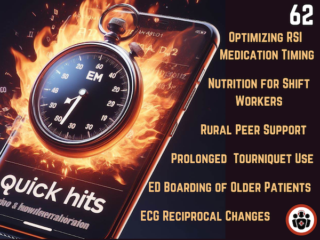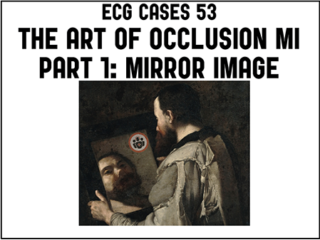EM Quick Hits 62 Optimizing RSI Medication Timing, ED Boarding of Older Patients, Prolonged Tourniquet Use, Rural Peer Support Programs, ECG Reciprocal Changes, Nutrition Tips for Shift Workers
On this month's EM Quick Hits podcast: Anand Swaminathan on optimizing RSI medication timing, Brittany Ellis on ED boarding challenges in older patients and solutions to ED crowding and flow, Dave Jerome on managing prolonged tourniquet application, Nour Khatib and Phil Gillick on a rural peer support case, Jesse McLaren on ECG reciprocal changes in acute coronary occlusion, and Melody Ng on practical nutrition tips for shift workers...










